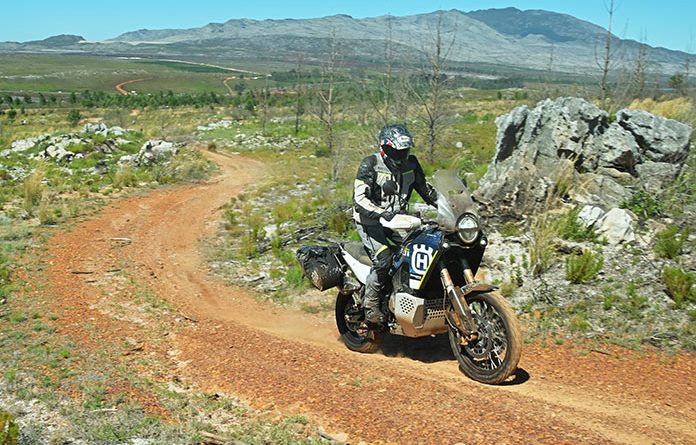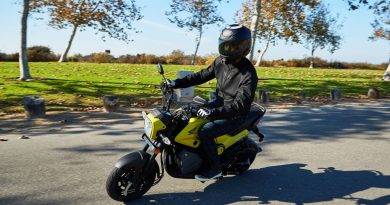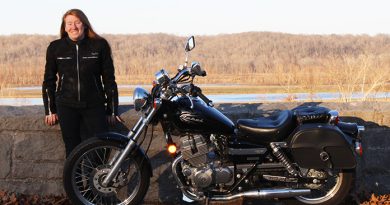2023 Husqvarna Norden 901 Expedition | First Ride Review
Walking up to the Husqvarna Norden 901 Expedition for the first time, the bold graphics caught my eye. In a departure from the subdued matte-black paint scheme on the standard Norden 901, the Expedition sports a blue and white colorway with yellow accents, a large white Husqvarna logo, and white handguards and side panels. Like the standard model, the graphics include topographical lines that bring to mind far-flung places where one might venture on the Expedition.
Related: 2022 Husqvarna Norden 901 | First Ride Review
The visual prowess of the new machine got me excited. The inverted WP Xplor fork – an upgrade from the WP Apex unit on the standard Norden – has an eye-catching WP logo and red accents on the silver tubes. The wrap-around skid plate is big and rugged, protecting both the underside of the engine and the lower pods of the horseshoe-shaped fuel tank.
The Expedition looks the business, and all I wanted to do was ride it.
But is it the off-road beast I wanted the first Norden to be? The standard model was released just last year, and it planted a prominent flag for Husqvarna – a legendary off-road brand – onto the ADV landscape. The Expedition ups the platform’s game with higher-spec WP Xplor suspension, a taller windscreen, and side carriers with a pair of 18-liter waterproof saddlebags. Several optional features and accessories for the Norden are standard on the Expedition, including the Explorer ride mode, a beefier skid plate, heated grips and seat, a centerstand, and Bluetooth connectivity for infotainment and navigation. It’s priced at $15,799, a $1,300 premium over the Norden 901.
Enough speculating, let’s ride!
Husqvarna Norden 901 Expedition in South Africa
Husqvarna did an amazing job plotting a route up and down epic mountains, over rolling hillsides, and along rugged coastlines near Cape Town, South Africa. Our first day started with a short stint on the freeway to get comfortable on the machine, and then we wicked it up on a hardpacked gravel road through vineyards and recently harvested grain fields. It was super dusty, so we tried leaving enough space between riders to avoid the dust without losing sight of those ahead of us. With a quick glance down, I saw 136 kph (84 mph) on the TFT display, and I wondered, Are we in a hurry?
GEAR UP
Helmet: Arai XD-4
Jacket: Alpinestars Bogota Pro Drystar
Gloves: Alpinestars Bogota Drystar XF
Pants: Alpinestars Bogota Pro Drystar
Boots: Sidi Adventure 2 Gore-Tex
Our route took us along the edge of a lake, and the scenery was breathtaking. Then we returned to the tarmac and blasted down a beautiful canyon road with towering cliffs, majestic mountains, and deep ravines. Back and forth we went, from gravel roads to highways at a brisk pace. The Norden’s 889cc parallel-Twin, which cranks out a claimed 105 hp and 73.8 lb-ft of torque, was pegged at 7,000 rpm in 6th gear without complaint, even though redline is 8,500 rpm.
Day 2 brought more serious off-road terrain, with technical two-track, wet sand, and gnarly, rutted-out hillclimbs. At one point, facing exposed rocks and step-ups as the trail steepened toward a peak, I thought to myself, There’s no way this bike is making it to the top. It looked like something only an enduro bike should tackle but not this bike, not with its road-biased tires with 36 psi in them. But the Norden proved to be quite the mountain goat, and we successfully summitted the hill.
Then it was on to an enduro-type loop section with sand, loose red rock, hardpacked dirt, and a wet, grassy stretch. We did several loops, each slightly faster and messier than the last, pushing the Norden 901 Expedition harder with each pass. Then we charged up a steep and crumbling single-lane paved road. What a climb, and what a view from the top! It was an amazing couple of days to test an adventure bike – the perfect mix of a challenging route and out-there countryside.
Related: Motorcycle Camping on a Honda CB500X and Husqvarna Norden 901
Report Card
The Husqvarna Norden 901 is built on the same platform as the KTM 890 Adventure and 890 Adventure R, a bike I’ve previously sampled. They share an engine and much of the same technology, such as ride modes, cornering ABS and traction control, Motor Slip Regulation, and a quickshifter. As on the KTMs, ABS is linked to the ride modes, so selecting the Street or Rain ride mode activates the Road ABS mode, and selecting the Offroad or Explorer ride mode activates the Offroad ABS mode.
But the Explorer ride mode is fully customizable. Riders can select among four different throttle-response maps (Rally, Offroad, Street, or Rain), select either ABS mode, and toggle between 10 levels of traction control for the rear wheel on the fly, ranging from Level 0 (off) to Level 9 (most intrusive). I found that Level 3 allowed for nice power slides without letting things get too out of hand.
The biggest change on the Expedition relative to the standard Norden 901 is the suspension. Compared to the WP Apex setup on the base model, the Expedition’s WP Xplor fork has larger diameter tubes (48mm vs. 43mm) and more travel (9.4 inches vs. 8.7 inches), and the Xplor PDS (Progressive Damping System) shock also has more travel (9.4 inches vs. 8.5 inches). The KTM 890 Adventure R also has Xplor suspension, but the Expedition has softer damping for a more comfortable ride. After two hard-charging days of riding, I can tell you that the bike’s handling is phenomenal.
On pavement, the added stiffness of the 48mm fork kept the front end firmly planted no matter how hard I pushed into turns, even with the additional travel. The damping allowed the Expedition to float down the road, but it never felt spongy or bouncy. Off-road was a different story. At high speeds on long, fast gravel roads, I felt equally confident until I hit a loose rock or pothole and the handlebar did a quick 1-2-3 twitch – just enough to remind me to tone it down. On gnarly trails, I felt the softness of the stroke and used all the travel, but it never held me back and I experienced less jarring on my body than what I’ve experienced on the 890 Adventure R.
Before the more technical riding on Day 2, I asked the Husqvarna techs to firm up the damping front and rear (there’s a settings chart under the rider seat). Adjusting the fork is simple since there are compression and rebound clickers atop the fork tubes; adjusting the shock requires tools that are found in the toolkit under the side panel. The changes made a big difference. On the road, I could feel small imperfections in the tarmac, and I could dive into corners with even more confidence and speed. Off-road was even better. I felt more in tune with the bike, allowing me to push the limits. There was no more twitch at high speeds, and the bike tracked straighter through sandy sections. On rough, rocky trails, the tires didn’t deflect as much, though it would have been even better if we could have aired them down.
The Pirelli Scorpion Rally STRs on the Expedition, which have roughly a 70/30 on/off-road bias, performed well on pavement and on fast-paced gravel roads. We flogged them hard, and they provided confident, consistent grip. In sand and on some of the more technical off-road sections, however, I would have preferred a more aggressive knobby. Tires are always a compromise, and the Pirellis are versatile tires with big knob blocks that should hold up well during long multiday tours.
Related: Riding the Ozarks on a Husqvarna 701 Enduro and a Kawasaki KLR650
Jack of All Trades
Adventure bikes have a tough job. They need to be rugged and capable of tackling a wide variety of off-road terrain, they need to be robust enough to withstand abuse and carry heavy loads, and they need to provide enough power, comfort, and sophistication to satisfy riders who want to carve canyons or cross continents.
The Norden’s tubular chromoly-steel trellis frame is light and strong and uses the engine as a stressed member for added rigidity. The rest of the chassis consists of a steel trellis subframe and a cast-aluminum open-lattice swingarm. The steering stem, triple clamps, handlebar, and footpegs are also made of aluminum, saving weight without sacrificing durability.
The parallel-Twin engine is certainly up to the task. It’s a lively powerplant, yet dual balancer shafts keep vibration to a manageable level. It makes plenty of power and torque, its throttle-by-wire enables the selectable ride modes and other rider aids, and its 6-speed transmission is equipped with a slip/assist clutch and the best quickshifter I’ve had the pleasure of using.
Whether seated or standing, I found the ergonomics to be spot-on for my 5-foot-11 frame. The low-slung fuel tank keeps weight down low for better balance and handling, and it keeps the upper part of the tank narrow between the knees. The tank, bodywork, and windscreen kept the wind and water off me for the most part. The windscreen isn’t adjustable, but it has a cut-out in the center that smooths the airflow. There was no buffeting, and I could look side to side without the peak of my helmet getting ripped by the passing air. When seated, I felt some airflow at neck level, but I didn’t mind, especially in the warm temperatures we were riding in.
With good wind protection, cruise control, and heated grips and seat, the Expedition is a good choice for those who want to burn miles. The luggage that comes standard, however, wasn’t quite up to the task. Halfway through Day One, the crossmember that connects the two side carriers came off and went flying end over end down the road behind me. That got repaired, but after two days of thrashing, the loaded bags hung down because the stitching on the upper backing was stretching and coming undone. The side bags look good and provide useful storage, but they don’t seem robust enough for serious off-road abuse.
For digital addicts, the Expedition has a connectivity unit that allows a smartphone to be paired via Bluetooth using the Ride Husqvarna Motorcycles app, which enables phone and music functions as well as Turn-by-Turn+ navigation and route planning. Pairing a Bluetooth helmet headset with the app allows riders to listen to music and take calls, with functions controlled via the left switch cube and displayed on the TFT dash. Maps can be downloaded for use offline, and up to 128 waypoints can be added to routes. I didn’t test the app, but I found the TFT display easy to read and the menus intuitive.
See all of Rider‘s Husqvarna coverage here.
Bottom Line
Overall, my criticisms of the Norden 901 Expedition are fairly minor. I’d like an adjustable windscreen, more robust luggage, and knobbier tires, but some of that just reflects my personal preferences. If you’re in the market for a middleweight do-it-all adventure bike, especially if you put emphasis on the “touring” part of Adventure Touring, then the Expedition is hard to beat. With its excellent on- and off-road handling, versatile engine, fantastic electronics package, and comfortable ergonomics, you’ll be smiling ear-to-ear on every adventure.
2023 Husqvarna Norden 901 Expedition Specs
Base Price: $15,799
Website: Husqvarna-Motorcycles.com
Warranty: 2 yrs., 24,000 miles
Engine Type: Liquid-cooled, transverse parallel-Twin, DOHC w/ 4 valves per cyl.
Displacement: 889cc
Bore x Stroke: 90.7 x 68.8mm
Horsepower: 105 hp @ 8,000 rpm (factory claim)
Torque: 73.8 lb-ft @ 6,500 rpm (factory claim)
Transmission: 6-speed, cable-actuated slip/assist wet clutch
Final Drive: X-ring chain
Wheelbase: 59.5 in. ± 0.6 in.
Rake/Trail: 25.8 degrees/4.2 in.
Seat Height: 33.6/34.4 in.
Wet Weight: 503 lb (claimed)
Fuel Capacity: 5.0 gal.
Fuel Consumption: 52.3 mpg (claimed)
The post 2023 Husqvarna Norden 901 Expedition | First Ride Review first appeared on Rider Magazine.



